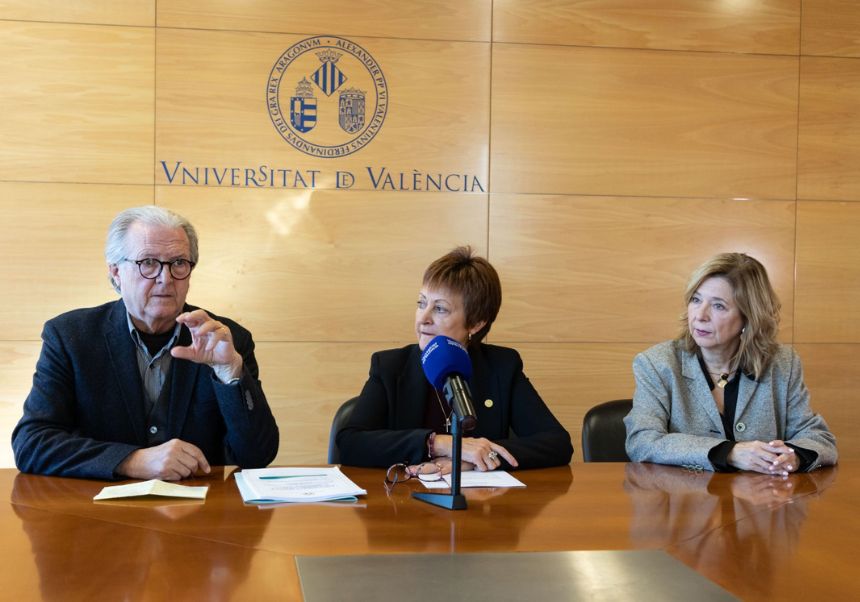
The Universitat de València presented on 5 February, in the Principal’s office building, the conclusions of the 1st Expert Conference on climate change and Iberian Mediterranean territory, held in the Centre Cultural La Nau the days 30 and 31 January. The Principal of the Universitat de València, María Vicenta Mestre, with the heads of this academic encounter, the professors of the UV, Joan Romero, professor emeritus of Human Geography and Ana Camarasa, professor on Physics Geography, have presented the 43 page document that from tomorrow, it will be remitted from the UV and through entry register, to the different government levels (local, autonomous, state) with the objective to bring the scientific knowledge at service of the public politics.
The document collects in 38 pages, a total of 82 recommendations elaborated by a total of 73 researchers, with more than 30 years of experience, from 15 universities and research centres, assembled last week in La Nau. Divided in a total of 13 theme areas, offers between5 and 6 recommendationseach of them, for “an intelligent governance” in issues like global warming, the state of the hydrological cycle, the desertification, grand fires, tourism, agriculture, cities, the integrated risk management, the use of metropolitan areas, infrastructures, communication, hydraulic works and public politics.
University heads agreed that the Universitat de València, for its foundational spirit and quoting the known reflection of the Spanish philosopher Ortega y Gasset, in ‘Misión de la Universidad’, which suggests that universities should first train professionals, but also citizens, saw itself “morally obliged after the dana” to lead this first encounter that was born with vocation for continuity. And it has been announced that there are universities interested in holding the second encounter which, undoubtedly, as Romero has announced, it will be made extensively to the rest of coastal countries: France, Italy, Greece and Maghreb. This first conclave has reunited specialists from the Iberian Mediterranean.
During the presentation, UV heads thanked the great university solidarity to attend this first conference that demonstrates “the large existent knowledge in Spanish universities and research centres and how this transfer can help to prevent, rethink, stop to analyse and give complex solutions to an existential risk: climate change. Joan Romero has underlined that today there are “two existential risks, that compromise human existence” . “One is climate change and the other one is artificial intelligence, and for that type of risks, what we have done from the UV is promote the meeting with the scientific community to think together”. “The social maturing processes are complex: first the scientific community defines, next, the media, the grand intermediaries of the liberal democracies define, next, most society feels that it has to be faced, and, last, they are added in the public calendars” to legislate and be effective. And he has done a diagnosis: “In Valencian Community, the media has already incorporate it, we need that it permeates in society for it to arrive to the politic field”, something necessary in every scale: the global and metropolitan.
During the opening of these sessions, and also in the presentation of the conclusions, the Principal, Maria Vicenta Mestre underlined the necessity to promote this first conference from the UV “in a time that has been marked and will be for a long time”, by the catastrophe provoked by the dana: “Is the founding spirit of the Universitat de València. We have to provide ideas for the public politics, to put science at the service of an intelligent governance. In the end, being a public university at the service of society”, and has underlined that is important to listen to science and that the government act accordingly, because “science is proactive and allows anticipation”. She concluded her intervention thanking the daily work of all the teaching and research staff reunited in this conclave and, specially, the Professors of the UV Joan RomeroandAna Camarasa.
Conclusions will be raised to the different levels of the government
Each thematic block has had a lecturer which, in turn, has coordinated various specialists for the elaboration of recommendations. Thereafter, each thematic area has present a short, medium and long term action plan out of a total of 5-6 concrete measures. In turn, the Directors of the congress have elaborated, together with the speakers of the thematic areas, a proposal of conclusions and recommendations that will be given to the Principal to raise it to different government levels.
The organisers of this encounter consider that the riverside countries of the UE and of the Ribera Sur face similar challenges. For that reason, the congress will be extended to different Mediterranean countries.
The session has been organised by the UV, through the The Lluís Vives European School of Thought, and it counts with the collaboration of Caixa Popular and the financial support of the Ministry of Science, Innovation and Universities and Ministry of Education, Culture, Universities and Employment.
Links:


